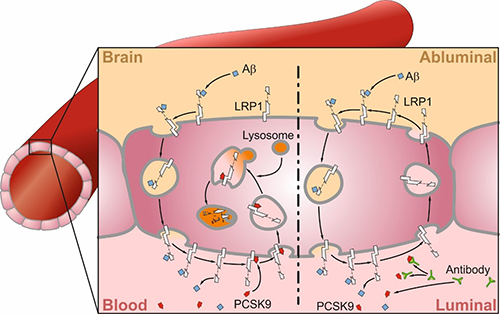Clearance of neurotoxic peptides across the blood brain barrier in Alzheimer’s Disease models
Despite the neurodegenerative disorder Alzheimer’s disease (AD) is the most common form of dementia in late adult life, there is currently no therapy available to prevent the onset or slow down the progression of AD. The progressive cognitive decline in AD correlates with a successive accumulation of cerebral amyloid β (Aβ) due to impaired clearance mechanisms. A significant percentage is removed by low density lipoprotein receptor related protein 1 (LRP1) mediated transport across the blood brain barrier (BBB) into the periphery. By using an established BBB model, we identified reduced LRP1 mediated brain to blood Aβ clearance due to PCSK9 across different endothelial monolayer in vitro. Consequently, the repetitive application of FDA approved monoclonal anti PCSK9 antibodies into 5xFAD mice decreased the cerebral Aβ burden across variants and aggregation state and prevented disease related impairment in hippocampus dependent memory formation. Our data suggest that peripheral inhibition of PCSK9 by already available therapeutic antibodies may be a novel and easily applicable potential AD treatment.

About the speaker
Claus Pietrzik studied Biology at the University of Bonn from 1989 to 1995 and received his PhD in 1998 also from the University of Bonn. He then moved to San Diego, California, where he performed a post-doctoral research at the School of Medicine (University of California San Diego) until 2001 before becoming Assistant Project Scientist from 2001 to 2003. Since 2003, he is Professor for Pathobiochemistry at the University Medical Center of the Johannes Gutenberg University in Mainz.
The research team of Claus Pietrzik focuses on the molecular and biochemical basis of neurodegeneration using Alzheimer’s disease as a model system. Through cell cultures and various animal models they analyze the pathobiochemical characteristics that cause or affect the progression of Alzheimer’s disease. Biochemical processes during the disease’s onset and progression are examined as well as possible new therapeutic approaches. Major topics include the processing of the amyloid precursor protein (APP) and the physiological function of its metabolites, the molecular and biochemical role of the blood-brain-barrier (BBB) during Alzheimer’s disease and the functional role of the low-density lipoprotein receptor-related protein1 (LRP1) in the nervous system.
We highly encourage PhD candidates and postdocs to join the ‘meet the speaker’ session after the talk. Please register by email to cathia.rausch@uni.lu
